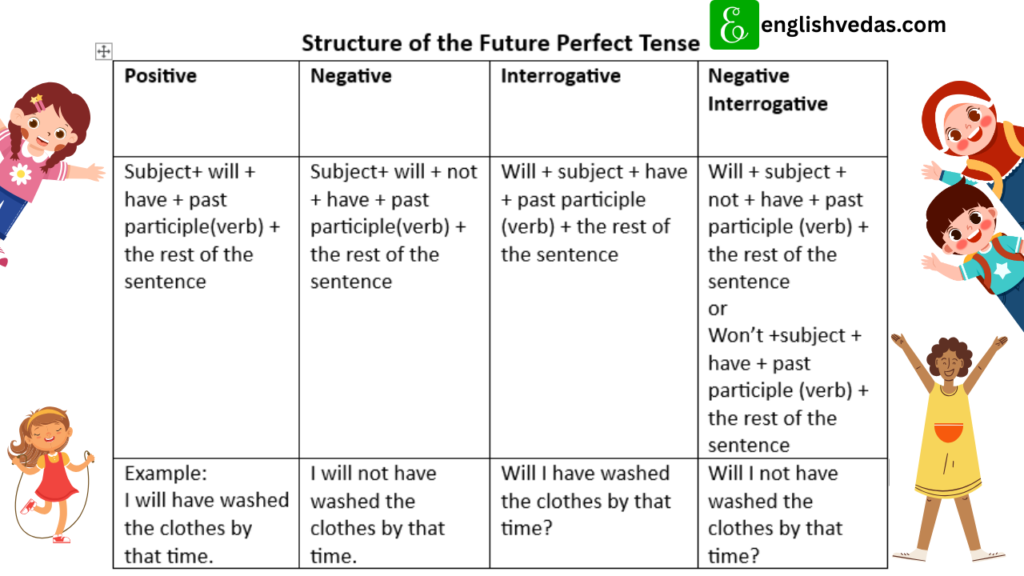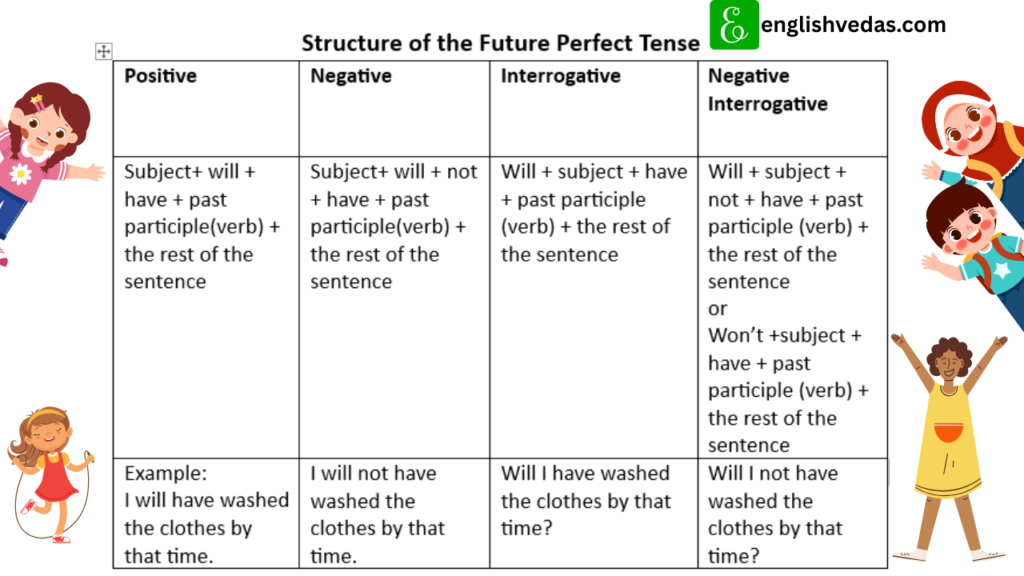This article concerns the Future Perfect Tense 100 examples, sentences, formula, and structure. Along with the formula, the structure of the Future Perfect Tense is explained, which makes it clear when the students can use this tense.

1. What is the Future Perfect Tense?
We use the future perfect tense to indicate the completion of an action by a certain time in the future.
For example, I will have done my homework by that time.
Before you go to see the doctor, he will have left the hospital.
2. What is the formula of the Future Perfect Tense?
In case you don’t know how to use the future perfect tense, here is the answer. This formula will help you to structure your sentences in the future perfect tense.
Formula:
Subject + will have (helping verbs) + past participle (verb) +object/rest of the sentence

3. What is the structure of the future perfect tense?
Apart from the formula, let us understand the structure of sentences in the positive, negative, interrogative, and negative interrogative forms. Look at the table below to understand the structure.
Structure of the Future Perfect Tense
| Positive | Negative | Interrogative | Negative Interrogative |
| Subject+ will + have + past participle(verb) + the rest of the sentence | Subject+ will + not + have + past participle(verb) + the rest of the sentence | Will + subject + have + past participle (verb) + the rest of the sentence | Will + subject + not + have + past participle (verb) + the rest of the sentence or Won’t +subject + have + past participle (verb) + the rest of the sentence |
| Example: I will have washed the clothes by that time. | I will not have washed the clothes by that time. | Will I have washed the clothes by that time? | Will I not have washed the clothes by that time? |

4. When to use the Future Perfect Tense?
- To denote an action that will be finished before a future time. By 2029, I will have written a novel.
- To indicate an action that will be over before another action in the future.
The students will have finished the class before the principal comes.
- To indicate an opinion about something that will or won’t happen at a particular time in the future.
I don’t think Rajeev will have completed the project by next month.
Time Expressions or Nuances for Future Perfect Tense
- By next week.
- By tomorrow.
- By the end of the month.
- In five hours.
- In ten days.
- Before winter ends.
- In another month.
- By the time she calls.
The Auxiliary Verbs in Future Perfect Tense
The Auxiliary Verbs in Future Perfect Tense are: –
- Will + have (for all subjects)
- He will have written the letter.
- They will have sung the song.
- Shall +have (we use ‘it’ with ‘I’ or we).
- I shall have drawn the picture by evening.
- We shall have eaten the pizza by then.
Past Participle Form of Verbs in Future Perfect Tense
Past Participle form of Verbs in Future Perfect Tense are:-
Structure
Subject + will +shall + have + past Participle
- Regular Verbs
Past Participle form of verb is formed by adding -ed.
- Clean – cleaned
- Work – worked
- Dance – danced
Example: By next month, they will have cleaned the hotel rooms.
- Irregular Verbs
Past Participle form of verbs are: –
- Do – done
- Fly – flown
- Send – sent
- Buy – bought
- Eat – eaten
Example: They will have done their homework before you arrive.
What are Future Perfect Tense Negative Example Sentences?
Future Perfect Tense Negative Sentences examples are:-
- She will not have written the book by 2027.
- They will not have done the work when you arrive.
- He will not have eaten the fruits by 9:00 am.
- We shall not have had a bath by 6:00 am.
- You will not have forgotten her by then.
- They will not have hidden the chocolate when Jack comes.
- The mechanic will not have repaired the car by Monday.
- The police will not have caught the police by the end of the week.
- John will not have sold his house before summer ends.
- Her grandmother will not have slept by the time she calls.
What Future Perfect Tense Interrogative Example Sentences?
Future Perfect Tense Interrogative example sentences are:-
- Will you have shown the pictures to your friend when she comes?
- Will they have broken the glass window?
- Will she have stitched the dress by then?
- Will we have spent the salary in ten days?
- Will he have seen the doctor by next week?
- Will she have watched the movie by next week?
- Will he have flown to Delhi by next Tuesday?
- Will the students have spoken to the principal by tomorrow?
- Will the teacher have taught the chapter by next week?
- Will I have won the badminton tournament by next month?
5. What are the examples of the Future Perfect Tense?
Here are the examples of the Future Perfect Tense:-
- He will have read the newspaper by then.
- She will have hung the clothes to dry by the time you come home.
- The children will have slept by 9.00 pm.
- He will have met his friend by then.
- They will have drunk orange juice.
- John will have spoken to his father next Monday.
- Sue will have shown the photographs to his mother.
- By the end of November, she will have got a job.
- The police will have caught the thief by 9.00 pm tomorrow.
- Ram will have spent all the money by Sunday.
- Jack will have eaten all the chocolates.
- Diane will have married John by the end of the year.
- By 9.00 am, I will have arrived at the office.
- The train will have departed by 7.00 pm.
- Mohan will have cleaned his room by then.
- Will John have organized the books in his cupboard when his mother comes?
- I will have read three by Tuesday.
- You will not have finished your homework by 8.00 pm.
- She will have saved enough money to buy a car.
- Will the football team have won the match?
- She will have ironed the shirts.
- Ravi will have bought a house by 2027.
- Riya will have baked the cake.
- Mia will have swum in the river.
- They will have painted the door.
- The mechanic will have repaired my watch.
- He will have lit the room.
- John will have grown the plants in his garden.
- She will have sung the song at the annual day function.
- His friends will have seen the photographs.
- They will have woken up by 8.00 am.
- She will have cut the vegetables.
- He will have driven to Shimla next week.
- The boy will have hidden the chocolate.
- She will have paid the school fees by 10.00 am.
- The baby will have torn the papers.
- Jack will have ridden a horse.
- William will have lost his passport.
- The hunter will have hunt the animals in the forest.
- Sita will have fed the dogs.
- The shopkeeper will have sold all the apples.
- The gardener will have sown the seeds by then.
- She will have smelled the flowers.
- They will have run in the park.
- She will have sewn her dress.
- The girl will have swept the floor.
- The boy will have kicked the ball.
- She will have forgiven her sister.
- Tim will have left home by 9.00 am.
- He will have laid out in the garden.
- Rajeev will have told her about the incident.
- She will have woken up by 6.00 am.
- She will have thought about the poor.
- Priya will have flown to New York by next week.
- He will have had a bath.
- They will have spread rumors about him.
- The burglars will have stolen the car.
- The bees will have stung him by then.
- John will have gone to the market by 9.00 pm.
- He will have learnt English by then.
- Sam will have rung his doorbell.
- The sun will have risen by then.
- He will have sat in the first bench.
- She will have taken care of the babies.
- She will have dealt with the issues by then.
- She will have fed the dogs by 7.00pm.
- The labourers will have dug the hole for the well.
- They will have spent all their money by the end of the month.
- The bees will have stung the children.
- The boys will have swum in the river by then.
- The student will have told his secret to his parents.
- They will have understood the implications of telling a lie.
- Ravi will have kept all his toys in the cupboard.
- Sonia will have written a letter to her grandfather.
- The farmer will have sewed the seeds by then.
- He will have had a bath by 7.00 am.
- The wrestler will have bent the iron rod.
- The sun will have shone up in the sky by 11.00 am.
- They will have frozen the ice in the ice tray.
- The girls will have taken the permission to go on a picnic from their parents.
- Daniel will have dealt with the consequences of telling a lie.
- Johny will have eaten all the fruits in the kitchen.
- Rohan will have worn his new t-shirt.
- She will have stuck all the stamps on the letters.
- The patient will have gone to his home by Monday.
- The girls will have crept into the hostel, by the time the warden arrives.
- The children will have burst all the balloons in the room by then.
- Mandy will have got his appointment letter by then.
- The people will have taken the initiative to keep the surroundings clean.
- The family of the victim will have wept all night.
- The teacher will have informed the students about the debate competition.
- Our neighbours will have settled in London by 2027.
- Priya will have decorated her room with cards and flowers.
- Rajni will have sung a song in the annual day function.
- The guards will have forbidden the people to enter the venue.
- Maya will have learned Chinese by then.
- Divyam will have recited the poem in front of the class.
- Gunjan will have ridden a motorbike.
- Her mother will have cooked chicken for her.
- They will have sought some help from their relatives.
Frequently Asked Questions:-
1. What is the Future Perfect Tense?
The future perfect tense is used to describe an action that will be completed before a specific time or event in the future.
2. What are 10 examples of future perfect?
Examples:
I will have written the book by 2026.
They will have talked to the principal by afternoon.
You will have completed your homework by then.
They will have cleaned the room by 10.00 am.
She will have seen the movie by Sunday.
The shopkeeper will have sold the toys by this time tomorrow.
John is coming at 6.00 pm. I will have finished cleaning by then.
They will not have been married by 2027.
She will have flown to London by November.
He will have slept by 10.00 pm.
3. When do we use the Future Perfect Tense?
We use the Future Perfect Tense,
To tell that something will be completed by a given time in the future.
To predict that something will be done in the future.
To talk about an action that will be completed in the future.
4. What are some common time expressions with the Future Perfect Tense?
The time expressions with the Future Perfect Tense are:-
by (by tomorrow, by next week, by )
before (before 9 a.m., before they arrive)
by the time (by the time they arrive, by the time you leave)
Read More:-
- 100 Powerful Examples of Future Continuous Tense and Structure
- Mastering ‘Will’ vs. ‘Shall’ : Difference, Use, Rules, and Mind-Blowing Examples
- Use of It in English Grammar: Sentences and Examples
- Either and Neither Key Surprising Differences with 50 Example Sentences

Written by Sukhjit Kaur, English educator with 17+ years of experience helping students master grammar and writing. Through EnglishVedas.com, she simplifies English grammar using examples from daily life and classrooms.

